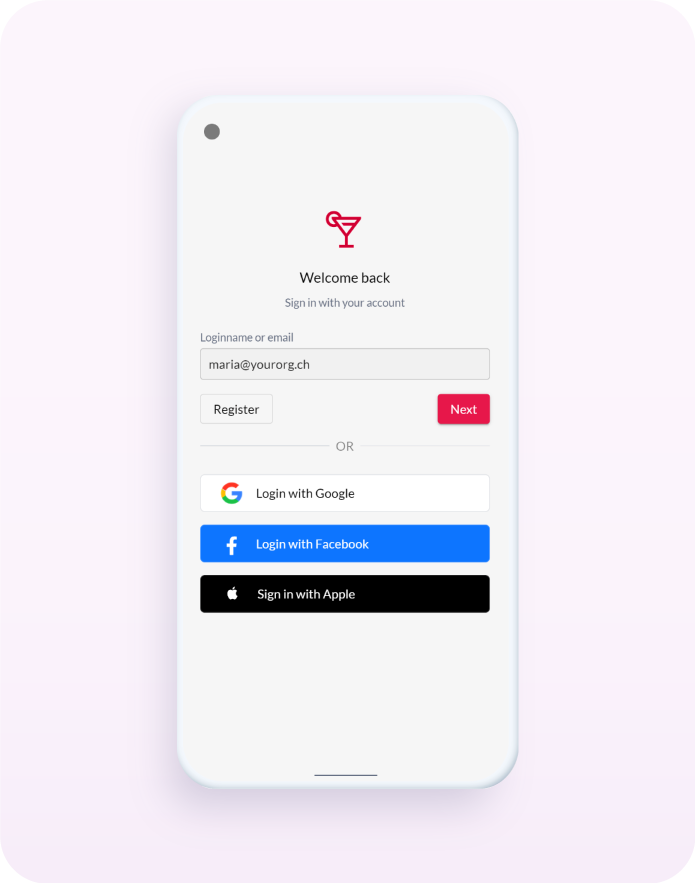Social Logins: The Unexpected Drivers of Business Growth

Marketing
In 2010, only two years after Facebook's social login launch, 250 million users and two million third-party websites started using this new login alternative. With the introduction of many contemporary social identities over the years, it is no surprise that more and more platforms are continuously expanding their supply of available authentication options. The popularity of the social-login method is evident, given its convenient and user-friendly nature: It saves its users valuable time by not requiring the completion of a registration form and also spares them the effort of remembering yet another password.
As an authentication platform with the goal of the best possible user experience, ZITADEL strives to eliminate login inconveniences by heavily expanding the number of its Identity Providers: Very soon, every user will be assured a comfortable login via their preferred social identity. Whereas, thus far, ZITADEL has exclusively supported OIDC-compliant providers, it will soon remove this restriction to provide a broader range of options, such as Apple ID, Microsoft Live, Github, Gitlab, and Microsoft Tenants (AzureAD).
Besides the obvious advantage of increased login convenience, social logins were also proven superior in enhancing business growth. To adequately explain this unexpected correlation, it is essential to know how social logins work and how they benefit end-users and companies alike.
How do social logins work?
Though there are many different providers for social logins (such as Facebook, Google, or Twitter), they all provide authentication in a near-identical fashion.
For them to work, the user must follow these simple steps:
- Upon entering the application or website, the user can choose his preferred social network provider (for example, Facebook).
- The website or app sends a login request to the selected provider directly, or ZITADEL relais this request to the chosen identity provider.
- Once the social provider confirms the user's identity, the user will get access to the application, and the registration process is completed. The selected method can now be used to log in at any time.

The benefits of social logins
Implementing social logins can heavily enhance the user experience of an application. Some of the most notable benefits for end-users include:
- Easy sign-up and sign-in: Logins via Apple ID, Microsoft Live, or other identity providers are simple and only involve clicking a few buttons. This method is more convenient for the user than filling out a long registration form and manually logging in.
- Less password reliant: We all must remember an overwhelming number of passwords. Using a social login means users don't have to create and keep track of even more credentials. Thus, failed login attempts will be heavily reduced, and users will be less hesitant to sign up.
- Raise trust: A social login on your page provides a recognizable and uniform login method. Users will feel more comfortable sharing their data with unknown pages via identity providers they already trust.
- Better mobile experience: Dealing with passwords and usernames on your smartphone can be frustrating. Social logins help to make the mobile experience more enjoyable.
Due to its many perks, it is no surprise that countless end-users prefer to confirm their identity via a social login option: According to a study by "loginradius," 70.69% of people aged 18-25 prefer social login over the traditional registration form. Accordingly, this simplified login method can significantly enhance business growth by helping companies increase the number of customers creating accounts, thus expanding their potential customer base. Not only are Social Logins effective in gaining new users, but also in retaining the existing ones: As claimed by "Janrain" and "Blue.", 65% of consumers are more likely to return to a website that automatically welcomes them through social login.
Apart from higher conversion rates, social logins further help your company by:
- Reducing stress on Support Teams: The support team will spend less time dealing with security alerts or password requests from failed login attempts by switching to passwordless with social login.
- Increasing login verification: Social Logins add a layer of verification to login attempts by requiring confirmation from the chosen identity provider. Accordingly, it is more resilient to spam or harmful logins.
- Reducing bounce rates: Customers are more likely to abandon a site if they must fill out the traditional long registration form. The bounce rate can be reduced by making social login a possibility.
- Simplifying Checkout: For e-commerce applications, the simplicity of social logins can heavily increase the checkout experience. Thus, enabling them can lead to fewer abandoned carts and more purchases.
Social logins via ZITADEL
Since every user has a preference for social networks, it is crucial for authentication solutions, such as ZITADEL, to provide a broad selection of social identity providers. By introducing a heavily expanded selection of social login templates, ZITADEL allows your application's users to sign in or up with just a few clicks, using their preferred identity.
It is advised to integrate your applications with an identity management platform like ZITADEL, which can broker to many different identity providers out-of-the-box instead of integrating providers individually in your apps. When using a central identity broker, you don't need to worry about maintaining your code across different technology stacks, as well as you get the added benefit of a central audit log and user repository.
ZITADEL will support seven identity providers (Google, Apple ID, Microsoft Live, Github, Gitlab, and AzureAD) that users can individually configure and enable. To maximize the previously mentioned benefits of social logins, it is advised to set up more than just one sign-up option on your platform.
These formerly mentioned social login methods are included in ZITADEL's basic plan and are therefore entirely free for all users.
Furthermore, the software doesn't require you to fully integrate every login provider separately: As an identity broker, ZITADEL acts as a trusted intermediary service connecting your projects with different identity providers so that you only have to link the external identity providers to it. This feature is especially beneficial since embedding numerous Identity Providers directly into your apps is complex to maintain, time-consuming to set up, and hinders single-sign-on of users.
The Takeaway
Social logins provide benefits to both your organization and your users. It boosts conversions, reduces the stress on your support teams, and simplifies the checkout for e-commerce brands. By expanding the number of supported identity providers, ZITADEL will ensure that all your users can effortlessly sign up for your platform with their preferred social identity.
We would love to hear your input on which social logins we should integrate first.
Should you have questions regarding social logins or any related (or unrelated) topics, please contact us anytime on our ZITADEL Discord Server. Alternatively, you can reach us on our Twitter, Linkedin, Github pages, or our website.
Don't forget to give us a star over on GitHub if you like the project. Thank you for the support.